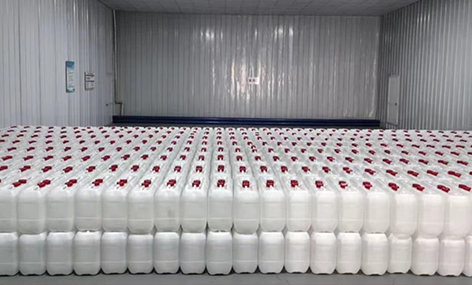
Dec . 04, 2024 17:58 Back to list
how to store glacial acetic acid
How to Store Glacial Acetic Acid Safely and Effectively
Glacial acetic acid (pure acetic acid) is a colorless liquid with a pungent odor, and it is widely used in various industries, including food preservation, production of plastic, and as a chemical reagent. However, due to its corrosive and hazardous nature, proper storage techniques are essential to ensure not only the safety of personnel but also the integrity of the material itself. This article provides a comprehensive guide on how to store glacial acetic acid safely and effectively.
1. Understanding the Hazards
Before discussing storage methods, it's crucial to understand the potential hazards associated with glacial acetic acid. It can cause severe skin burns and eye damage upon contact. Inhalation of its vapors can lead to respiratory issues, headaches, and dizziness. Furthermore, it is flammable, with a flashpoint of 39°C (102°F). Therefore, proper storage minimizes the risk of accidents and health hazards.
2. Choosing the Right Container
When storing glacial acetic acid, the choice of container is paramount. The most suitable materials for storage include glass, specific grades of polyethylene, and Teflon. It is vital to avoid using metal containers, as glacial acetic acid can corrode various metals, leading to leaks and contamination. All containers should be tightly sealed to prevent the escape of vapors and reduce the risk of fire.
3. Environmental Conditions
Glacial acetic acid should be stored in a cool, dry place, away from direct sunlight and heat sources. The ambient temperature should ideally be below 25°C (77°F) to prevent excess vaporization. A dedicated chemical storage area with good ventilation is crucial, as it helps disperse any harmful vapors that might accumulate.
4. Safety Measures
In addition to appropriate containers and storage conditions, safety measures must be in place
- Labeling Clearly label all containers with the content and associated hazard warnings. This labeling should be visible from all angles and written in English, or in the relevant language of the storage area.
how to store glacial acetic acid

- Secondary Containment Use secondary containment systems, such as spill trays or bunds, to capture any leaks or spills, preventing them from spreading and facilitating easier cleanup.
- Personal Protective Equipment (PPE) Anyone handling or near glacial acetic acid should wear adequate PPE, including gloves, safety goggles, and aprons made of resistant material.
- Emergency Procedures Establish clear emergency procedures, including spill response and evacuation plans, and ensure that all personnel are trained in these procedures.
5. Fire Safety
Always consider fire safety when storing flammable materials. Keep glacial acetic acid away from oxidizers and ignition sources. It is advisable to keep a suitable fire extinguisher nearby, specifically one rated for chemical fires. Additionally, install smoke detectors and ensure that the area is equipped with a first-aid kit in case of an emergency.
6. Regular Inspections
Regular inspections of the storage area, containers, and safety equipment are vital. Check for signs of leakage, corrosion, or deterioration of containers. Ensure that all safety equipment is in working condition and replenish any used materials promptly.
7. Disposal Considerations
When it comes to disposing of any excess or waste glacial acetic acid, follow local regulations and guidelines for hazardous waste disposal. Never pour it down the drain, as it can harm the environment and local water systems.
Conclusion
Storing glacial acetic acid safely requires careful consideration of container materials, storage conditions, safety measures, fire safety, and regular inspections. By following these guidelines, businesses and laboratories can minimize risks associated with this hazardous chemical, ensuring a safer working environment for all. Proper education and adherence to storage procedures are essential in handling glacial acetic acid responsibly.
-
SmartAgri Solutions - Precision Farming&Soil Monitoring
NewsJul.13,2025
-
Industrial Solutions-Example Inc.|Smart Manufacturing&Energy Efficiency
NewsJul.13,2025
-
Food Grade Glacial Acetic Acid-Pure Quality|High-Purity Acetic Acid,Food-Grade Chemical
NewsJul.13,2025
-
Industrial Efficiency Solutions-NextGen Technologies|Advanced Automation&Data-Driven Analytics
NewsJul.12,2025
-
Smart Manufacturing Solutions-Example.com|Enhance Efficiency&Reduce Costs
NewsJul.12,2025
-
Food grade glacial acetic acid
NewsMar.07,2025
